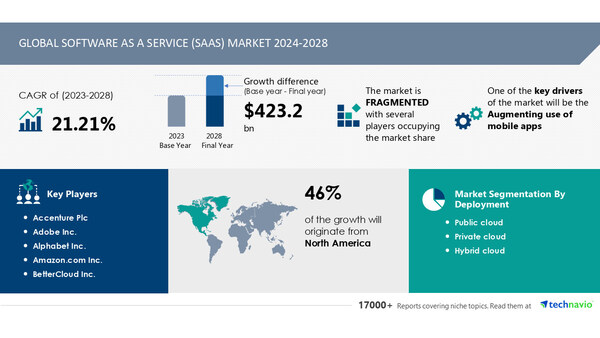NEWS PROVIDED BYTechnavio
Jun 27, 2024, 18:00 ET
NEW YORK, June 27, 2024 /PRNewswire/ — The global software as a service (SaaS) market size is estimated to grow by USD 423.2 billion from 2024-2028, according to Technavio. The market is estimated to grow at a CAGR of 21.21% during the forecast period. augmenting use of mobile apps is driving market growth, with a trend towards increasing use of vertical SaaS. However, issues associated with system integration poses a challenge. Key market players include Accenture Plc, Adobe Inc., Alphabet Inc., Amazon.com Inc., BetterCloud Inc., Box Inc., Cisco Systems Inc., Convedo Ltd., Fujitsu Ltd., Hewlett Packard Enterprise Co., Infosys Ltd., International Business Machines Corp., Intuit Inc., Microsoft Corp., Oracle Corp., Salesforce Inc., SAP SE, ServiceNow Inc., Shopify Inc., and Zendesk Inc..

Get a detailed analysis on regions, market segments, customer landscape, and companies – Click for the snapshot of this report
| Forecast period | 2024-2028 |
| Base Year | 2023 |
| Historic Data | 2018 – 2022 |
| Segment Covered | Deployment (Public cloud, Private cloud, and Hybrid cloud), End-user (Large enterprises and SMEs), and Geography (North America, Europe, APAC, South America, and Middle East and Africa) |
| Region Covered | North America, Europe, APAC, South America, and Middle East and Africa |
| Key companies profiled | Accenture Plc, Adobe Inc., Alphabet Inc., Amazon.com Inc., BetterCloud Inc., Box Inc., Cisco Systems Inc., Convedo Ltd., Fujitsu Ltd., Hewlett Packard Enterprise Co., Infosys Ltd., International Business Machines Corp., Intuit Inc., Microsoft Corp., Oracle Corp., Salesforce Inc., SAP SE, ServiceNow Inc., Shopify Inc., and Zendesk Inc. |
Key Market Trends Fueling Growth
Vertical Software as a Service (SaaS) refers to cloud computing solutions designed for specific industries, such as retail, healthcare, or automotive manufacturing. These solutions offer customizable features tailored to clients within these industries and supply chains. Examples include retail analytics software and healthcare business intelligence tools. Enterprises benefit from vertical SaaS due to its industry-specific focus, enabling the generation of valuable customer data and insights. In May 2021, Honeywell International Inc. Launched a cloud-based SaaS solution for building owners and managers, combining operational and business data for improved decision-making and efficiency. Vendors are increasingly offering vertical SaaS to address client demands and expand their customer base. IBM’s Genelco SaaS, designed for the insurance industry, is an example of this trend. The use of vertical SaaS solutions provides significant business value, contributing to the growth of the global SaaS market.
The Software as a Service (SaaS) market is experiencing significant growth across various application areas like Human Resource Management, Media and Entertainment, and more. Leads and prospects for SaaS are abundant among startups and businesses seeking flexible solutions. Trends include integration with 3D printing technologies and mobile devices. Investment in SaaS is ongoing, with companies like Alphabet’s Google Cloud Marketplace and Microsoft Cloud leading the charge. Business models include Cloud Software, Cloud Consulting Services, and IBM Cloud Integration. Digital transformation brings challenges such as data breaches and cyber-attacks, necessitating focus on data security concerns. Employee well-being and operational efficiency are key considerations. The competitive environment is intense, with Communication Service Providers and IT companies implementing remote work policies. Cloud computing technologies continue to evolve, with hybrid cloud and public cloud offerings from the Cloud Security Alliance. Augmenting company capabilities is a primary goal. However, ongoing costs, including hosting data, electricity, employee fees, and downtime issues, must be managed carefully.
Research report provides comprehensive data on impact of trend. For more details- Download a Sample Report
Market Challenges
- Enterprises are increasingly turning to Software as a Service (SaaS) solutions due to their cost-effectiveness and flexibility compared to traditional IT deployments. However, integrating new software systems and IT infrastructure into existing monolithic architectures poses challenges. Monolithic applications, which combine UI and data access code into a single program, make it difficult to integrate new software. Furthermore, data stored in various formats across different business units can create interoperability issues when migrating to cloud-based software. Lastly, selecting the appropriate integration tool from numerous vendors offering SaaS solutions for various applications, while ensuring hybrid integration capabilities, is a complex task. These integration challenges may hinder the growth of the global SaaS market during the forecast period.
- The Software as a Service (SaaS) market is experiencing significant growth, with key industries like private cloud, human capital management, operations management, large enterprises in IT and telecom, healthcare, education, B2B and B2C enterprises adopting this model. Challenges include VAT regulations, quarterly earnings reports, and expert opinions on relevant segments. Main drivers are digitization levels, current exchange rates, and country-specific needs. SaaS leaders like AppOmni and Veeva Systems offer Enterprise Resource Planning (ERP) and Customer Relationship Management (CRM) solutions using Artificial Intelligence (AI), Internet of Things (IoT), and Platform as a Service (PaaS). SMEs and small businesses benefit from mobile SaaS growth, allowing access to information, devices, and team partnerships via laptops, tablets, and web browsers on a subscription basis for official purposes. Time and space efficiency are major attributing factors. Deployment is typically cloud-based, ensuring flexibility and ease.
For more insights on driver and challenges – Download a Sample Report
Segment Overview
This software as a service (saas) market report extensively covers market segmentation by
- Deployment
- 1.1 Public cloud
- 1.2 Private cloud
- 1.3 Hybrid cloud
- End-user
- 2.1 Large enterprises
- 2.2 SMEs
- Geography
- 3.1 North America
- 3.2 Europe
- 3.3 APAC
- 3.4 South America
- 3.5 Middle East and Africa
1.1 Public cloud- The Software as a Service (SaaS) market continues to grow, with businesses increasingly relying on cloud-based solutions for their software needs. SaaS offers several advantages, including cost savings, flexibility, and ease of use. Companies can access software applications through the internet, eliminating the need for expensive hardware and maintenance. SaaS providers offer regular updates and improvements, ensuring that businesses have access to the latest features. This model allows businesses to focus on their core competencies while leaving the software management to the experts. Overall, the SaaS market is a cost-effective and efficient solution for businesses of all sizes
For more information on market segmentation with geographical analysis including forecast (2024-2028) and historic data (2018 – 2022) – Download a Sample Report
Research Analysis
The Software as a Service (SaaS) market continues to grow at an unprecedented rate, driven by the increasing level of digitization and the shift towards remote work policies. Communication service providers and B2C enterprises are major contributors to this market, with SaaS products becoming essential for time, space, and information management. Cloud Software, including Google Cloud Marketplace and Microsoft Cloud, dominates the scene, offering a wide range of solutions for businesses of all sizes. IT companies are also leveraging SaaS to provide cloud consulting services and integrate various systems using IBM Cloud Integration. The main drivers of this market include ease of use, cost savings, and flexibility. Current exchange rates and quarterly earnings of key players are closely watched by experts in the relevant segment. SaaS enables team partnerships through laptops, tablets, and other devices, making collaboration more efficient than ever before. VAT and other regulatory considerations are important factors for businesses adopting SaaS solutions.
Market Research Overview
The Software as a Service (SaaS) market is a significant segment of the cloud computing industry, enabling businesses to access and use software applications over the internet on a subscription basis. SaaS offers flexibility, scalability, and cost savings for businesses of all sizes, from SMEs to large enterprises in various industries such as IT and telecom, healthcare, education, B2B, and B2C. Key drivers for SaaS market growth include the level of digitization, remote work policies, and the increasing adoption of cloud computing technologies. Communication Service Providers and IT companies offer SaaS products in areas like Human Capital Management, Operations Management, and Customer Relationship Management. SaaS covers various application areas like Enterprise Resource Planning, Artificial Intelligence, Internet of Things, Robotic Process Automation, and more. The market is shaped by ongoing costs, including hosting data, electricity, and employee fees, as well as downtime issues and the competitive environment. Main drivers for SaaS growth include flexibility, investment, and the shift towards mobile SaaS and cloud-based software services. Relevant segments include public cloud, private cloud, and hybrid cloud solutions. Current exchange rates and country-specific levels of digitization also impact the market. SaaS market statistics show steady growth, with major attributing factors like time, space, information, devices, team partnerships, and official purposes. Key trends include the integration of PaaS, SME adoption, and the impact of net neutrality and VAT on quarterly earnings. Expert opinions and industry reports provide insights into the current state and future prospects of the SaaS market.
Table of Contents:
1 Executive Summary
2 Market Landscape
3 Market Sizing
4 Historic Market Size
5 Five Forces Analysis
6 Market Segmentation
- Deployment
- Public Cloud
- Private Cloud
- Hybrid Cloud
- End-user
- Large Enterprises
- SMEs
- Geography
- North America
- Europe
- APAC
- South America
- Middle East And Africa
7 Customer Landscape
8 Geographic Landscape
9 Drivers, Challenges, and Trends
10 Company Landscape
11 Company Analysis
12 Appendix
About Technavio
Technavio is a leading global technology research and advisory company. Their research and analysis focuses on emerging market trends and provides actionable insights to help businesses identify market opportunities and develop effective strategies to optimize their market positions.
With over 500 specialized analysts, Technavio’s report library consists of more than 17,000 reports and counting, covering 800 technologies, spanning across 50 countries. Their client base consists of enterprises of all sizes, including more than 100 Fortune 500 companies. This growing client base relies on Technavio’s comprehensive coverage, extensive research, and actionable market insights to identify opportunities in existing and potential markets and assess their competitive positions within changing market scenarios.
Contacts
Technavio Research
Jesse Maida
Media & Marketing Executive
US: +1 844 364 1100
UK: +44 203 893 3200
Email: media@technavio.com
Website: www.technavio.com/
SOURCE Technavio



